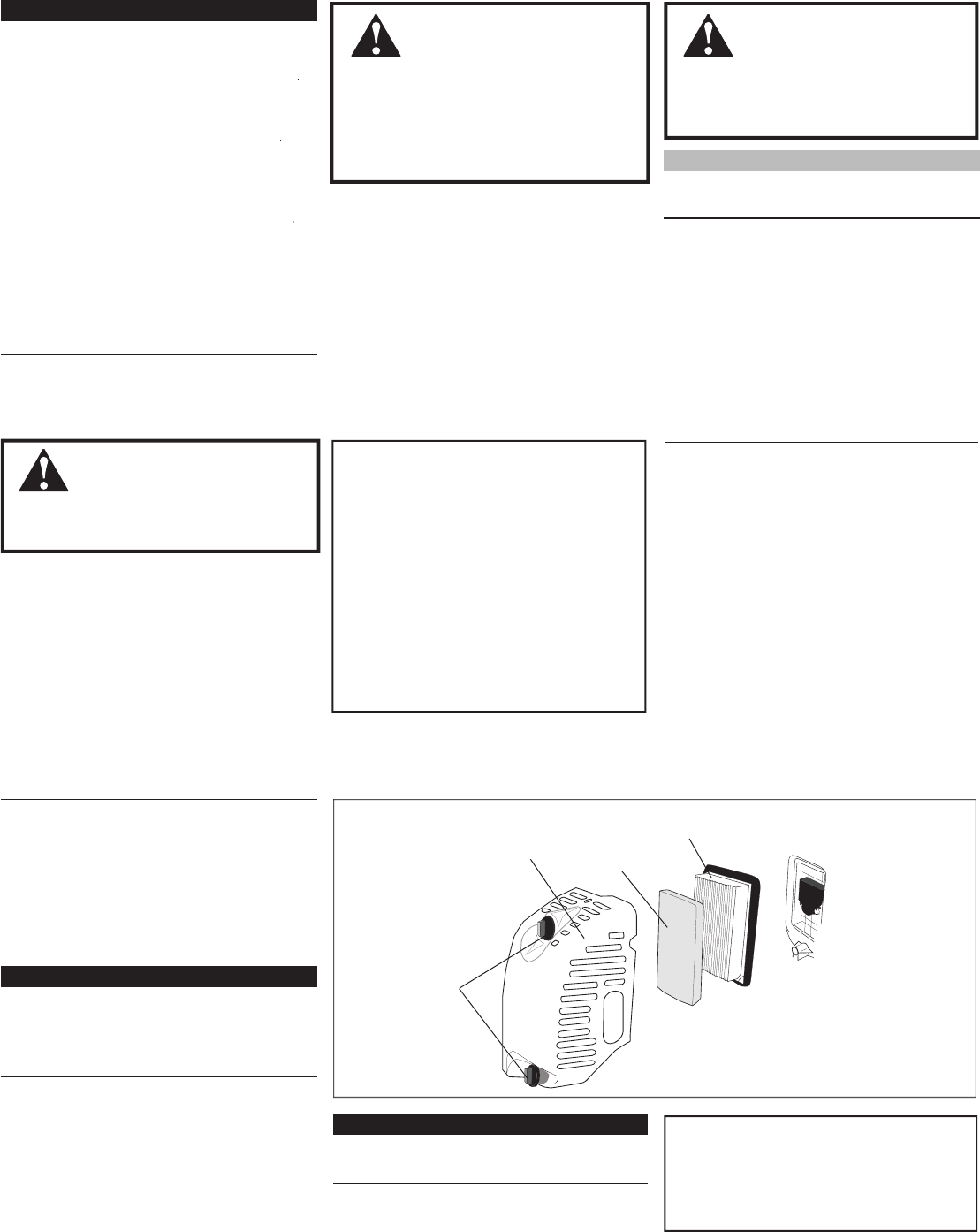
To remove the cover, loosen the
thumbscrews and lift.
Air Cleaner
Element
Cover
Figure 21
Pre-Filter
Thumbscrews
13
IMPORTANT!
MAINTENANCE, REPLACEMENT
OR REPAIR OF EMISSION CONTROL
DEVICES AND SYSTEMS MAY BE PER
-
DEVICES AND SYSTEMS MAY BE PER-DEVICES AND SYSTEMS MAY BE PER
FORMED BY ANY REPAIR ESTABLISH
-
MENT OR INDIVIDUAL, HOWEVER,
WARRANTY REPAIRS MUST BE PER
-
WARRANTY REPAIRS MUST BE PER-WARRANTY REPAIRS MUST BE PER
FORMED BY A DEALER OR SERVICE
CENTER AUTHORIZED BY SHINDAIWA
CORPORATION THE USE OF PARTS
THAT ARE NOT EQUIVALENT IN PER
-
THAT ARE NOT EQUIVALENT IN PER-THAT ARE NOT EQUIVALENT IN PER
FORMANCE AND DURABILITY TO
AUTHORIZED PARTS MAY IMPAIR THE
EFFECTIVENESS OF THE EMISSION
CONTROL SYSTEM AND MAY HAVE
A BEARING ON THE OUTCOME OF A
WARRANTY CLAIM.
Maintenance
Daily Maintenance
WARNING!
To reduce re hazard, keep
the engine and mufer free of dirt,
debris, and leaves.
WARNING!
Non-standard parts may not
operate properly with your unit and
may cause damage and lead to per
-
sonal injury.
NOTE:
Using non-standard replacement parts
could invalidate your Shindaiwa warranty.
Every 10 Hours
(more frequently in dusty conditions)
CAUTION!
Never operate the blower if the air
cleaner assembly is damaged or
missing!
Inspect the engine, tank, and hoses
■
for possible fuel leaks, and repair as
necessary.
Inspect the entire blower for loose,
■
damaged, or missing components, and
repair as necessary.
Carefully remove any accumulations
■
of dirt or debris from the muffler and
fuel tank. Dirt build-up in these areas
can lead to engine overheating, fire or
premature wear.
IMPORTANT!
Direct the air stream at the inside face of
the filter only!
WARNING!
Before performing any main
-
tenance, repair or cleaning work on
the unit, make sure the engine is com
-
pletely stopped. Disconnect the spark
plug wire before performing service or
maintenance work.
CAUTION!
The engine is cooled by air drawn
into the air intake cover on the blower
housing. The blower fan then pushes
the cooling air through an opening in
the fan housing, forcing it past the cyl
-
inder cooling ns. Failure to keep the
cooling system and its passages clear
of debris will likely result in engine
overheating, a major cause of seri
-
ous engine problems that can lead to
failure.
Prior to each workday, perform the
following:
Remove all dirt and debris from blower
■
exterior and the engine. Check the
cooling fins and air cleaner for clog
-
ging and clean as necessary.
Remove the air cleaner cover by loosen
-
1.
ing the thumbscrews and lifting. See
Figure 21.
Remove and inspect the pre-filter. If the
2.
pre-filter is torn or otherwise damaged,
replace it with a new one.
IMPORTANT!
The blower uses a special high capacity
dry-type air filter element. The filter should
not be cleaned with a liquid cleaner and
must NEVER be oiled!
Clean the pre-filter with soap and water.
3.
Let dry before reinstalling.
Inspect the air cleaner element. If
4.
the element is damaged or distorted,
replace it with a new one.


















